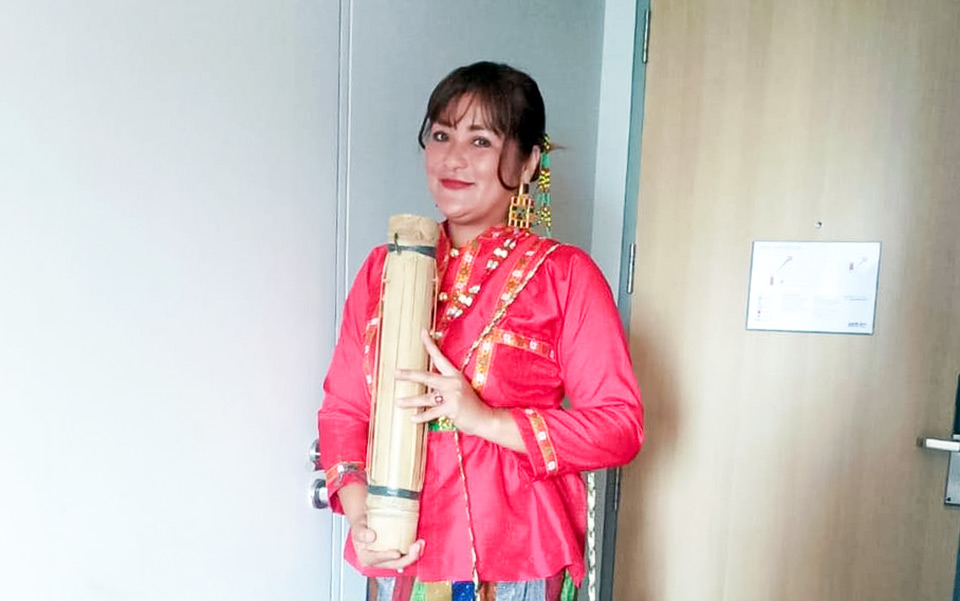From Where I Stand: “There is nothing I want more than a peaceful community where we can live in our ancestral domain, practicing our traditional culture”
Aileen Kesa Marie U. Hualde grew up in an indigenous community under martial law in the southern Philippine region of Mindanao. After having to flee her own home as a child, today she is advocating for other indigenous women who are still suffering from the consequences of conflict, violence and displacement.Date:

Where I grew up, armed conflict and violence are intertwined parts of our story as a people. I was only a young girl when we were placed under martial law. To me, this is one of the darkest periods in the history of Mindanao.
We were living in a peaceful indigenous village when a group of armed men stormed our house. They took my mother hostage, destroyed our agricultural livestock and stole our personal belongings, including the products we were selling from our small sari-sari store [generalist corner shop]. Women from my community became victims of sexual- and gender-based violence, and many were forced into marriage at a young age. Because of these traumatic events and the fear of continued violence in my community, me and my family decided to leave our home to seek for protection. I remember living in constant fear for our lives.
After the conflicts, indigenous women were left at the margins of society, poor and with no access to education. Many indigenous women are therefore illiterate and have very low self-esteem. From having witnessed this suffering and social injustices, I was motived to advocate for the empowerment of indigenous women in the Bangsamoro region. I decided to leave my work as a teacher to support my fellow indigenous women. I realized that if we do not do it ourselves, no one else will tell our story, let alone address our concerns.
The passage of the 2018 Bangsamoro Organic Law (BOL) has however ushered in new opportunities for us. Now, there is a mechanism aimed at promoting the welfare of indigenous people. We also have the Ministry of Indigenous People’s Affairs, which is a foot in the door. While this is great, indigenous women are still underrepresented in formal decision-making. There is for example not a single indigenous woman in the newly established Bangsamoro Government. I dream about seeing women from my community in our decision-making bodies, advocating for our agenda on rural and indigenous women’s empowerment. To enable indigenous women to take the helm in the political sphere, it is important that we get the proper training and skills necessary on women’s public leadership, gender programming and peacebuilding. We also need to learn about our own rights before we can advocate for gender equality and peace in the political sphere.
Finally, I feel that peace is within our reach, but it definitely has a price. It does not come without sacrifices, especially not without women’s sacrifices. Peace should always begin with me. What I mean is that peace should emanate from each individual and translate into a value and a way of living. It may sound cliché, but it is the first step to long lasting peace. If you cannot teach this to your children and family, you cannot advocate for peace in the bigger society either. There is nothing I want more than a peaceful community where we can live in our ancestral domain, practicing our traditional culture and live in harmony with our Moro kinsfolk. Given our shared history and identity, we are able to co-exist peacefully.
As an indigenous woman, my personal story is no different than the narratives of other indigenous women. Community members in Barangay Kuya, South Upi are still grappling with displacement due to conflicts over land. That is why I need to continue my commitment to advance the lives of indigenous women. I pray that no indigenous child will ever need to leave their home and experience the same trauma that I went through as I was young girl.”
Aileen Kesa Marie U. Hualde is the Executive Director of the Women of Rajah Mamalu Descendants (WORMD). She is a member of the Teduray-Lambangian, an indigenous people’s group native in the Bangsamoro homeland. She is active in socio-civic works especially in responding to the needs of her fellow Teduray displaced by various violent armed conflicts. She is one of the pioneering women empowerment advocates among indigenous peoples in the BARMM. Her story demonstrates Sustainable Development Goal (SDG) 16, which aims to promote peaceful and inclusive societies, and SDG 5 on gender equality and women's empowerment.